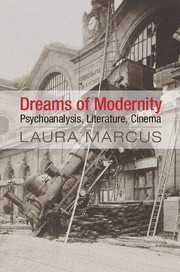Book contents
- Frontmatter
- Dedication
- Contents
- Acknowledgements
- Introduction
- Chapter 1 The Lodger
- Chapter 2 Oedipus Express
- Chapter 3 Railway Reading
- Chapter 4 ‘From Autumn to Spring, Aesthetics Change’
- Chapter 5 ‘A Hymn to Movement’
- Chapter 6 Staging the ‘Private Theatre’
- Chapter 7 The Newness of the ‘New Biography’
- Chapter 8 European Witness
- Chapter 9 Dreaming and Cinematographic Consciousness
- Chapter 10 Directed Dreaming
- Chapter 11 ‘In the Circle of the Lens’
- Chapter 12 Virginia Woolf and the Art of the Novel
- Index
- References
Chapter 3 - Railway Reading
Published online by Cambridge University Press: 05 November 2014
- Frontmatter
- Dedication
- Contents
- Acknowledgements
- Introduction
- Chapter 1 The Lodger
- Chapter 2 Oedipus Express
- Chapter 3 Railway Reading
- Chapter 4 ‘From Autumn to Spring, Aesthetics Change’
- Chapter 5 ‘A Hymn to Movement’
- Chapter 6 Staging the ‘Private Theatre’
- Chapter 7 The Newness of the ‘New Biography’
- Chapter 8 European Witness
- Chapter 9 Dreaming and Cinematographic Consciousness
- Chapter 10 Directed Dreaming
- Chapter 11 ‘In the Circle of the Lens’
- Chapter 12 Virginia Woolf and the Art of the Novel
- Index
- References
Summary
At the close of the twentieth century, it was possible to buy a short thriller or detective story from vending machines in Paris railway and underground stations. A spokeswoman for the publisher, Éditions de la Voûte, said in early 1997: ‘The idea is just a rethink of the success of station and airport novels. Since commuter journeys tend to be short, we decided that none of our books should take more than one hour to read.’ The novel on offer was changed every week, alternating between a new book and a reprint. The first offering in the Metro-Police series, as it was called, was Gérard Delteil’s Le Nouveau Crime de L’Orient Express, a new version of Agatha Christie’s famous train-crime novel.
Walter Benjamin noted the elective affinity between the railway journey and detective fiction in an article, published in 1930, entitled ‘Kriminalromane, auf Reisen’ [‘Detective Novels, on Journeys’]. In this short piece Benjamin (who, like a number of the theorists associated with the Frankfurt School, was fascinated by detective fiction and indeed wrote a synopsis of a detective novel) observed that railway travellers prefer to buy their reading material from station bookstalls, opting for the contingency of what they find there rather than for the certainties of what they might bring from home:
less out of pleasure in reading than in the dim feeling that they are doing something which pleases the gods of the railway. He [the traveller] knows that the coins which he offers up to this sacrificial column recommend him to the protection of the boiler god which glows through the night, the smoke naiads which play above the train, and the demon who is master over all lullabies. He knows all of them from dreams, but he also knows the succession of mythical trials and dangers which has presented itself to the Zeitgeist as a ‘railway journey,’ and the unforeseeable flow of spatio-temporal thresholds over which it moves, starting with the famous ‘too late’ of the person left behind, the original image of everything missed, through to the loneliness of the compartment, the fear of missing the connection and the grey of the unknown station into which he is riding. Unsuspectingly, he feels himself drawn into a giants’ kingdom and recognises himself to be the mute witness of the struggle between the gods of the railway and the station.
- Type
- Chapter
- Information
- Dreams of ModernityPsychoanalysis, Literature, Cinema, pp. 59 - 76Publisher: Cambridge University PressPrint publication year: 2014



